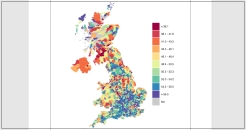 Social capital in the United Kingdom
Social capital in the United Kingdom
From research by the Behavioural Insights Team (BIT)
Social capital is a concept used in sociology and economics to define networks of relationships which are productive towards advancing the goals of individuals and groups. It involves the effective functioning of social groups through interpersonal relationships, a shared sense of identity, a shared understanding, shared norms, shared values, trust, cooperation, and reciprocity.
Social capital has long been thought to be an important factor in shaping economic opportunity. For example, one study in the United States found that children from disadvantaged backgrounds tend to achieve higher incomes in adulthood in communities that foster more friendships between high- and low-income individuals.
BIT examined whether similar patterns hold in the United Kingdom. Their measures of social connection were based on data from Facebook for approximately 20 million UK residents (about 58% of the population aged 25–64). They estimated each person’s income and social connections, examining factors such as network cohesion, volunteering, and friendships between different income groups. Using economic mobility data from England, they analysed how social ties impact economic opportunity. They also studied the link between social capital and well-being using survey data on life satisfaction, trust, and support. Finally, they used Facebook data to estimate economic mobility across the UK, extending beyond England.
What did they find?
1. UK friendships bridge economic divides. High-income people in the UK have more high-income friends, but social networks are less stratified by class than in the US. The poorest 50% of people in the UK still have about half (47%) of their friendships with high-income people, compared to about 39% in the US.
2. There are variations per region. Friendships across economic lines are more common in the South of England, particularly in the areas around London. In contrast, cross-class friendships are less common in regions such as South Wales, parts of Northern England, the Scottish Central Belt, and Northern Ireland.
3. Upward mobility increases with friendships across economic divides. Communities with higher rates of friendship between low- and high-income individuals have higher rates of upward mobility. Low-income children who grew up in the top 10% of the most economically connected local authorities in England earn 38% more per year on average (£5,100) as adults relative to low-income children in the bottom 10% of local authorities.
4. Most friendships form locally and in schools. And hobby groups and workplaces promote cross-class friendships among their members. Residential segregation often limits the amount of cross-class interactions and connections in neighbourhoods and schools. Workplaces and hobby groups promote more cross-class friending among their members, but people typically only form a small portion of their friendships in these settings.
5. Social capital is associated with higher subjective wellbeing. People with more high-income friends, or a tightly-knit social circle, report higher happiness, life satisfaction, trust, and feelings of belonging. After controlling for personal income, people with the highest share of very high-income friends (1 in 5) report 5% higher happiness levels and 23% greater trust, compared to people with the lowest share of very high-income friends (1 in 40).
Read the full report here.
Retweet about this article:
From research by the Behavioural Insights Team, 29/07/2025